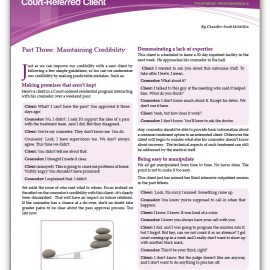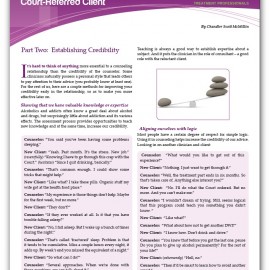Topic: DUI/DWI
Using Leverage in Counseling the Court-Referred Client, Part 3
Clients will test boundaries just to see what will happen when they do. If you’re prepared for such tests, and can avoid some predictable errors in response, you’ll find that the course of treatment runs smoother.
Topics: client engagement and motivation, counseling skills, DUI/DWI, leverage, Using Leverage Series
Using Leverage in Counseling the Court-Referred Client, Part 2
Wasn’t it Archimedes who promised that given a lever long enough and a place to stand, he would move the world? In using leverage, think of credibility as the place you stand.
Topics: counseling, court-mandated, DUI/DWI, establishing credibility, leverage, Using Leverage Series
Using Leverage in Counseling the Court-Referred Client, Part 1
Understanding how leverage works in the context of addiction treatment can give you the tools to identify your client’s agenda, and help them over the “rough spots” that inevitably occur when you work with offenders.
Topics: counseling skills, court-mandated, DUI/DWI, leverage, Using Leverage Series
Engaging Coerced DUI Clients
First, they don’t understand why they’re in treatment, or how it could possibly benefit them. Second, they’re ticked off about having been coerced.
Topics: addicted offenders, client engagement and motivation, client types and needs, DUI/DWI, groups, legal problems
Using Leverage in Counseling the Court-Referred Client
Having a judge or a parole officer holding the big stick on them may be enough to get them into treatment, but it’s usually not enough motivation to get them beyond the minimum of compliance.
Topics: addicted offenders, criminal courts, DUI/DWI, legal problems, leverage, treatment, Using Leverage Series
Deterring Drunk Driving: Thoughts on Designing a System
If estimates are correct that a typical offender has driven under the influence between 60 and 100 times prior to first arrest, it’s clear the actual problem is far, far greater than arrests alone can document.
Topics: criminal courts, DUI/DWI, legal problems, policy
Deterring Drunk Driving: The Role of Treatment
It seems to me that a successful approach to DWI must be based on the assumption that drunk drivers are a diverse population.
Topics: criminal courts, DUI/DWI, legal problems
Deterring Drunk Driving: Do Sanctions Work?
One state estimates around a fifth of offenders are rearrested within three years of the prior conviction. Expand that window to five or ten years and the rate is likely substantially higher.
Topics: criminal courts, DUI/DWI, legal problems, research
Deterring Drunk Driving: Who’s Likely to Reoffend?
One or two (risk factors) is not as suggestive of repeat offending as four or five. But it does allow a clinician to apply a rough risk profile to a particular offender.
Topics: DUI/DWI, legal problems, research, risk factors
The Challenge of the Repeat Offense Drunk Driver
It’s difficult to squeeze a lot of motivational work into the course of outpatient counseling. Clinicians are anxious to get to the behavior change part.
Topics: client engagement and motivation, DUI/DWI, legal problems, program development, systems














